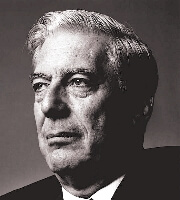by Mario Vargas Llosa
We don't know if there was one or many.
We don't even know if he existed
or if we invented him
to give an owner and a legend
to the poems that founded
the world we live in.
The empty sockets of his eyes
illuminate like two suns
the waters, the islands, and the beaches
of the Mediterranean.
Nor do we know if the stories
he sang had roots
in real history
or were fantasized
by his incandescent imagination.
I imagine him as a
kind
and eccentric old man
entertaining children and the elderly
with fabulous adventures
of warriors and monsters
in an unusual age
when men and gods
intertwined
and battles were won
with wooden horses,
elixirs, and magic.
I see him among shadows and
the crackling of bonfires, in
villages that smell
of wine and oil,
playing his lyre,
accompanied by the murmur of the sea
and the surf,
surrounded by expectant faces.
His imagination and his words
embellished the anecdotes
that sailors brought back from their voyages:
the voluptuous songs
of the sirens,
the bites of Scylla,
and the breaths of Charybdis
that sank the sailboats
and the shipwrecked sailors swallowed by
Polyphemus.
At the heart of his myths
beat
the gossip of the elders,
the laments of widows, and
the litanies of mothers
whose sons were kidnapped
by pirates
to become rowers.
I imagine his head like
a roaring volcano that washes away
not even fire
but stories,
a symphony of heroism,
apparitions, nightmares,
bravado, love, sorcery,
and lavish celebrations
of gods and goddesses
with men and demons.
No one knew where
he came from
or where he was going.
His beard was white, and
his eyes, before they were empty,
had been blue.
His tunic had a thousand patches,
and his sandals,
so worn,
had been around the world
and beyond.
The charm of his voice,
the softness of his words,
the color and phosphorescence
with which he narrated
gave his stories
the contagious power
of dance and music,
that trail that haunted
his listeners
in their dreams
and encouraged them to learn their verses
by heart
to repeat them
from parents to children
from town to town
and from century to century,
even to us.
Thank you, grandfather,
inventor of the West.
How poor our history would be
without your stories,
how mediocre
our dreams
without your dreams.
San Pedro de Atacama, February 22, 2008
Last updated April 14, 2025




